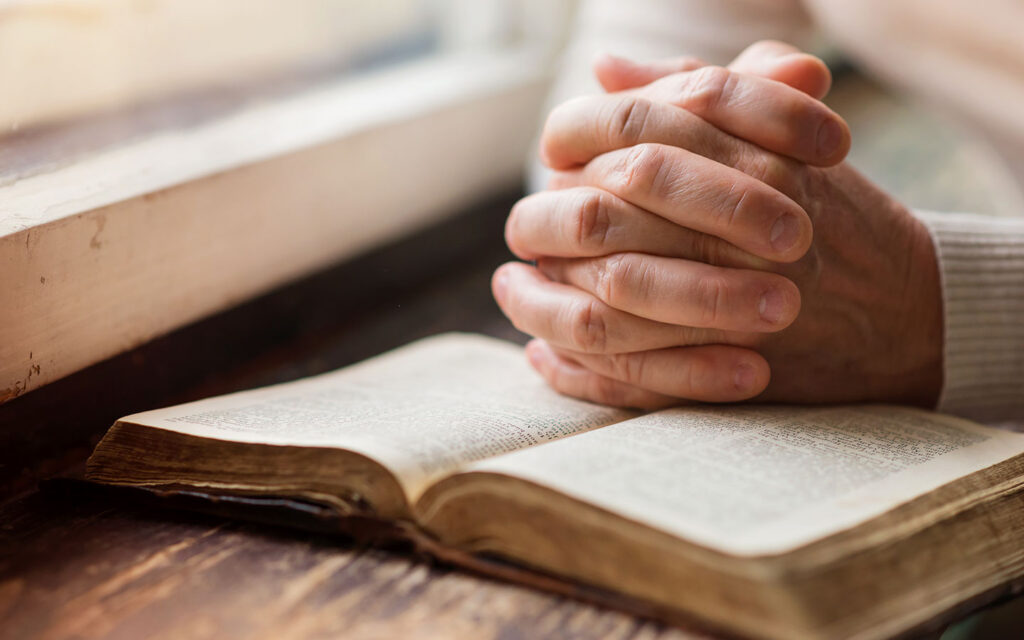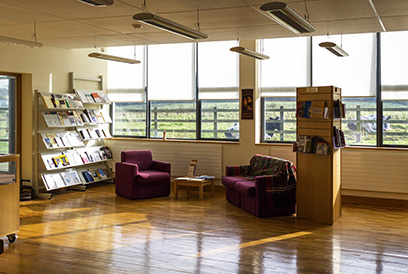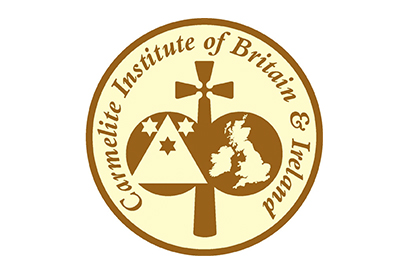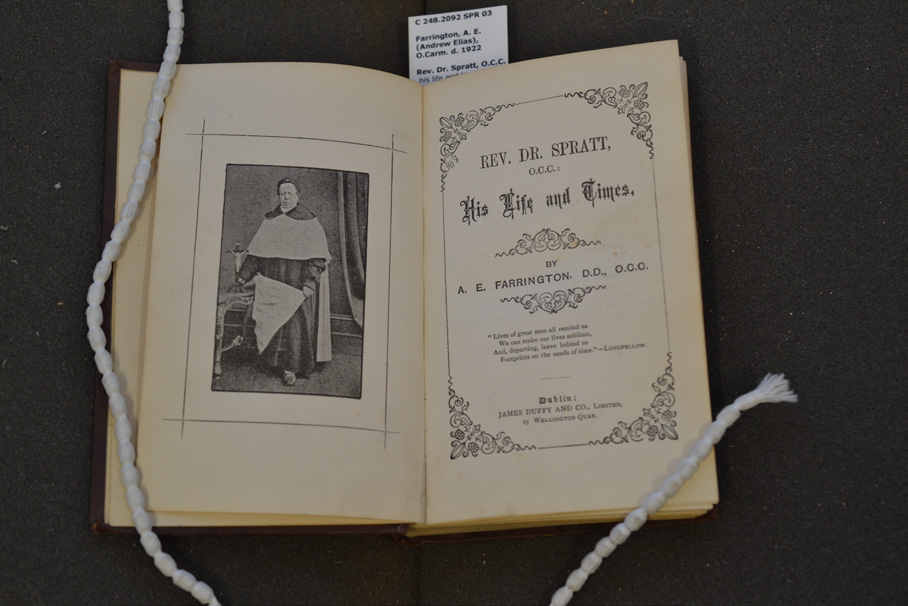
AMRI Statement in response to the publication of the Scoping Inquiry Report
AMRI Statement in response to the publication of the Scoping Inquiry Report into historical sexual abuse in Religious-run Catholic schools from 1927 – April 2023
Welcome to the website of the Irish Province of Carmelites. Please take some time to explore the site, which features a wide selection of news, articles, and other spiritual and intellectual resources.
Carmelites live and work in 26 nations throughout the world. We are teachers, retreat directors, chaplains to hospitals and prisons, in parish ministry, counsellors, spiritual directors, and missionaries.
In Ireland, Carmelites have care of one parish in Dublin: Whitefriar Street, which is also an important and historic city centre church. People come to Whitefriar Street and to other Carmelite churches at Kinsale, Kildare, Moate, Terenure College and Gort Muire to share in the celebration of the Eucharist and other religious services.
Irish Carmelites are still committed to education at Terenure College, Whitefriar Street, Third Level and through CIBI (Carmelite Institute of Britain and Ireland), which provides distance-learning courses on Carmelite Spirituality.
Opportunities for sharing and teaching the Carmelite spiritual tradition also arise through preaching, retreats and occasions of special devotion. The Irish Carmelites established a mission in Zimbabwe in 1946. This has now developed into a vibrant presence, with many young Zimbabwean Carmelites.
The canonisation of Titus Brandsma took place at St Peter’s, Rome, on Sunday, May 15th. This is a great moment of joy for the Carmelite Order, as St Titus has been an inspirational figure to all who walk the Carmelite path for many years.
Here we feature a selection of news stories from across our communities and ministries in Ireland. This section is updated regularly so please check back often for our latest news. To access an archive of all recent news stories please click here.

AMRI Statement in response to the publication of the Scoping Inquiry Report into historical sexual abuse in Religious-run Catholic schools from 1927 – April 2023

The British & Irish Province of Carmelites is hosting an online course for people aged 18 -35. ‘Exploring Carmel’, starts in September 2024 on Zoom. 12 sessions will provide the opportunity to grow spiritually and deepen awareness of God.

The National Board for Safeguarding Children in the Catholic Church in Ireland (NBSCCCI) has completed the Second Review of Child Safeguarding in the Irish Province of Carmelites. The report can be accessed here.
In this section, we feature all the upcoming Carmelite Saints & Blesseds Feast Days. In each case, we provide a very brief story of their lives and contribution both to the Order and society in general, together with a short prayer or reflection. We update this section regularly. For a comprehensive look at all Carmelite Saints and Blesseds, please see here.
In this section, we assemble all the readings for the coming week and provide a useful reflection on their main themes. We update this section on a weekly basis, so please check back regularly. To see more please visit our full year of reflections here.
Ordinary Time – The Twenty-Nineth Week | Readings: Sunday Cycle B; Weekday Cycle 2.

The Twenty-ninth Sunday in Ordinary Time
Isaiah 53:10-11; Psalm 32; Hebrews 4:14-16; Mark 10:35-45
Our first reading today comes from the “Suffering Servant” section within the book of the Prophet Isaiah. In the passage we see that the servant of God will suffer for the people in order to justify them. We know that the servant is Christ and through his passion, death and resurrection he has justified all human beings. In the gospel we see Jesus reminding the apostles and us also that those who wish to do the will of God and enter into eternal life must be the servants of all people. We cannot dominate people but must help all people to achieve perfection and this is done with a great deal of humility on our part and with an example of true Christian living. Most of us will not be called to suffer for our faith as Christ did but the suffering servant is the example which we must follow.
In the second reading from the letter to the Hebrews, the author tells us that we can confidently approach Christ with our weaknesses because Christ was human and knows our faults. Because of this, Christ will be merciful and gracious with us.
Alternative Gospel for Mission Sunday – Twenty-ninth Sunday, Year B:
Mark 10: 42-45
In the gospel for today we see Jesus reminding the apostles of the importance of service. Some had thought that being his followers would give them special places and privileges among the people but he is telling them that this is not case. The Mission of the Church is to spread the Good News of the kingdom and this can only be done through humble service. If we too serve our fellow men and women following Christ’s example then they will see the Body of Christ visible among them and we will have answered the Lord’s call to us as baptised Christians.
Ephesians 2:1-10; Psalm 99; Luke 12:13-21
In the letter to the Christian community at Ephesus on the western shore of modern-day Turkey, St Paul reminds his readers that humans were sinners who were ruled by their physical desires. Despite still being sinners God loved them greatly and sent his own Son to restore them to life. In the Gospel, Christ reminds us of the folly of storing up material goods here on earth. They only serve to distract us from the true treasure which we should be seeking – that is a place in the kingdom. Considering the great love of God and the sacrifice he made for us we should always keep the kingdom as the sole goal of our lives.
Ephesians 2:12-22; Psalm 84; Luke 12:35-38
St Paul tells us in the first reading that before Christ there was only the Law and only Jews could worship God. Through Christ we all now have the means to salvation because we can all become Christians regardless of our birth. He goes on to speak about a household and how we are now all part of that household through the saving power of Christ. In the Gospel we are told to be always ready because we do not know when the master will return to visit us. If we are living good Christian lives then we will be always ready and will not have to worry at the Lord’s return or our call to heaven.
Ephesians 3:2-12; Psalm – Isaiah 12; Luke 12:39-48
We read in our first reading from the letter to the Ephesians how the grace of God is meant for all peoples – be they Jew, Gentile or pagan. With this grace we can confidently draw closer to God. We are reminded again in today’s Gospel that we do not know the hour when we will be called to give an account of our stewardship and of our lives. When the Lord does return he will want to know if we have done all that he has told us to do which includes being full participants in the spread of the Good News.
Ephesians 3:14-21; Psalm 32; Luke 12:49-53
Today’s first reading contains the prayer which St Paul prayed for the Ephesians – that their faith would grow strong through the power of the Holy Spirit. In the Gospel we read an unusual passage in which Christ says that he came to bring division rather than peace. However, when we consider that he was talking about believer and unbeliever we can understand what he is saying. We are challenged to look into our hearts to see which category we fall into knowing that faith calls for action in our lives rather than simply reciting words.
Ephesians 4:1-6; Psalm 23; Luke 12:54-59
St Paul reminds us in the letter to the Ephesians that we all form part of the Body of Christ and that we should do all we can to build up the unity of that body. He also tells us how that should be done – through charity, selflessness, gentleness and patience and by believing in God as the head of all. Jesus admonishes the people in the Gospel for being able to read the weather but not being able to read the signs of the times and realise that he is the Messiah. We are challenged in our own day to read the signs of the times and to realise that we need Christ now more than ever before.
Ephesians 4:7-16; Psalm 121; Luke 13:1-9
In our first reading for today, St Paul again uses the analogy of the body to say that we each have our own role to play in the Body of Christ. Each person’s role is different but ultimately each is for the spreading of the Gospel and the building up of the kingdom and we must do all we can to fulfil that role. In the Gospel passage from St Luke, Jesus calls us to repentance in order to be saved. We should not put off our repentance until tomorrow but we should begin today for we do not know if we shall live to see tomorrow.
The Carmelite Order is present throughout the world, made up of people from many different cultures and traditions. What unites the Order is the call to live the threefold charism of prayer, community and service. Have you considered a life in the Carmelite Order?
Please see below some quick links to other sections in the site which you may find interesting.

The Carmelite Library, located in Gort Muire, Dublin, can be accessed by appointment.

The Carmelite Institute of Britain and Ireland (CIBI) provides distanced-learning courses in Carmelite Spirituality.

The Carmelite Archive, located in Gort Muire, Dublin, can be accessed by appointment.
Our website uses cookies to give you the best online experience. Please see our cookies page for further details or agree by clicking the 'Accept all cookies' button. Alternatively, please click the Cookie settings button to adjust which cookies this website stores during your visit.
Below you can choose which kind of cookies you allow on this website. Click on the "Save cookie settings" button to apply your choice.
FunctionalOur website uses functional cookies. These cookies are necessary to let our website work.
AnalyticalOur website uses analytical cookies to make it possible to analyze our website and optimize for the purpose of a.o. the usability.
Social mediaOur website places social media cookies to show you 3rd party content like YouTube and FaceBook. These cookies may track your personal data.
AdvertisingOur website places advertising cookies to show you 3rd party advertisements based on your interests. These cookies may track your personal data.
OtherOur website places 3rd party cookies from other 3rd party services which aren't Analytical, Social media or Advertising.

This content is blocked. Accept cookies within the '%CC%' category to view this content.